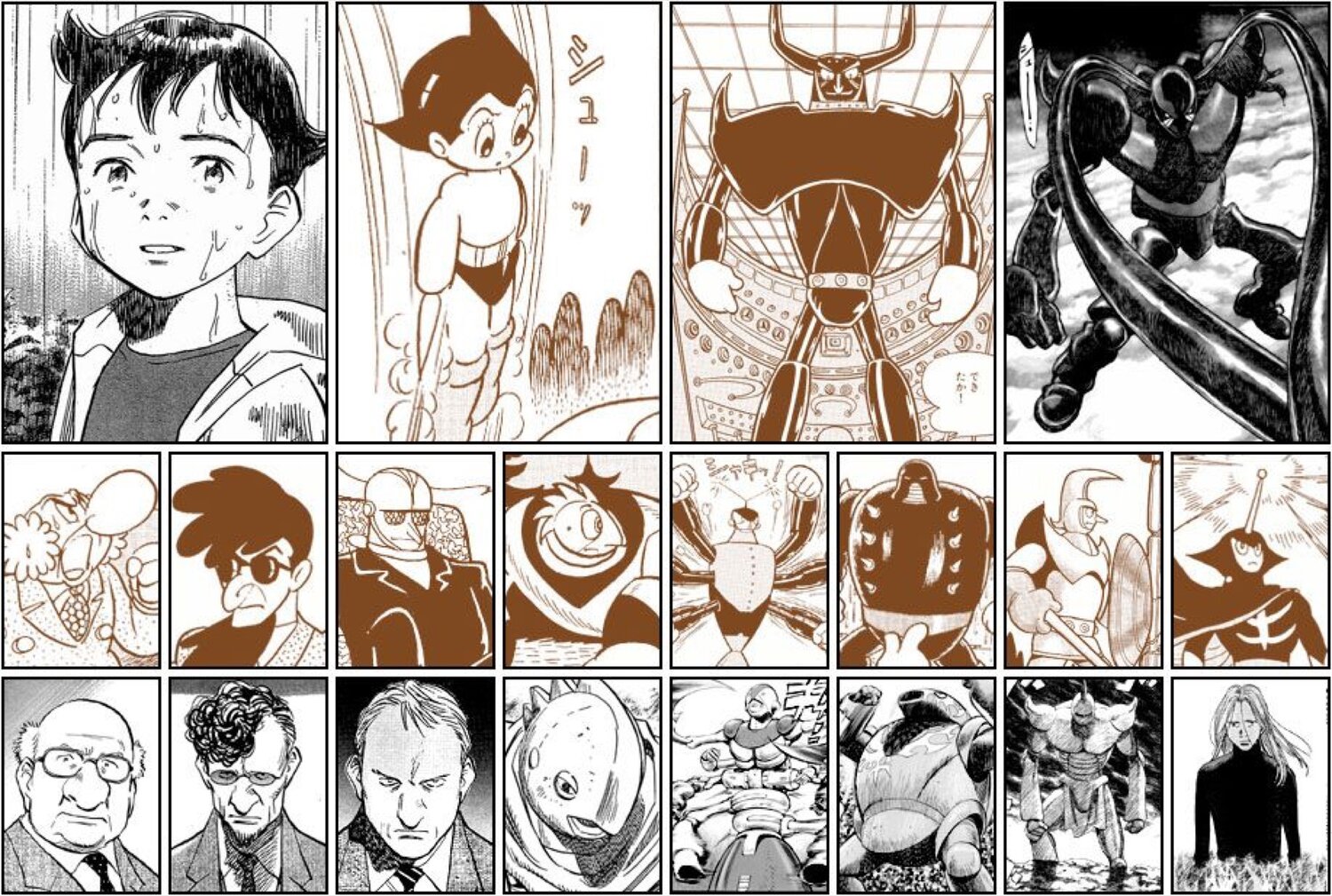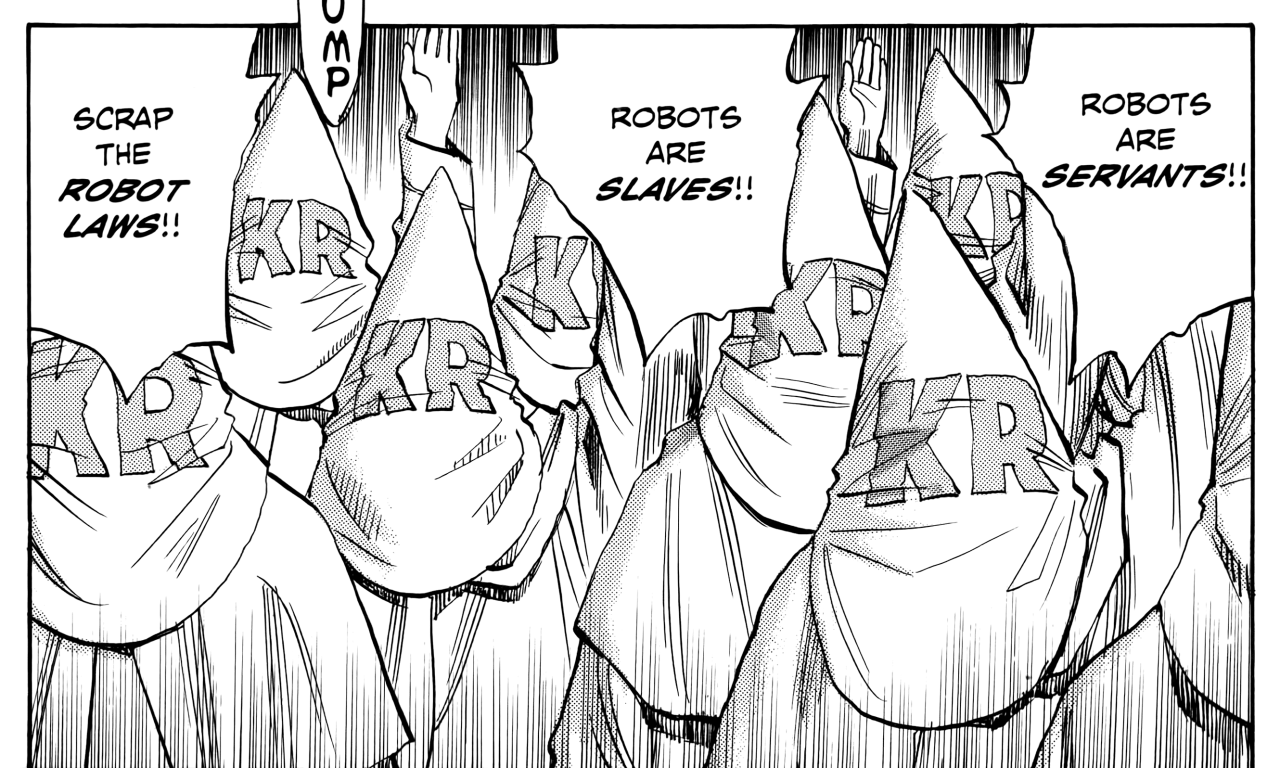Eisuke Hirota
Pluto follows a futuristic world in which technology is much advanced, to the point where robots exist in our every day lives. While this shows a great promise for science, Pluto also posits an important question: "What happens if robots gain consciousness?" Can humans and robots coexist in such a world, or will this feat cause one of the factions to drive the other into extinction?

Pluto is Naoki Urasawa's adaptation of Osamu Tezuka's Astro Boy, specifically "The Greatest Robot on Earth" arc turned into a philosophical, mystery story. If you've read any of Urasawa's other works, I think you can find tons of parallels between this and the rest. Gesicht, the protagonist of Pluto, is seeking truth to a mystery that scales grander than what he first thought it covers - this is akin to Kenji (20th Century Boys), Tenma (Monster), and Kevin (Billy Bat). Later, Gesicht (and the protagonists of the other stories) becomes encapsulated to uncover the truth, collaborates with other individuals equally caught up in the mess, and encounters numerous twists and events that cause us, the audience, to wonder (to quote Joey Bizinger, aka the AnimeMan) "how far does this hole go?"
Crucially, the question I mentioned before is what piqued my interest in Pluto. Robots and humans, both conscious. Can we live in such a world? I'd like to take this time to see both sides - for a shared world, and against a shared world.
Against.
In Pluto (and much of our actual world), robot research is prioritized for military endeavors. In our world, we already have factories where numerous robot arms assemble cars in minutes and warehouses swarmed with tons of turtlebots crawling around. Pluto focuses on a world some number of years ahead of that, featuring select humanoid robots that have been deployed in military combat, singlehandledly killing enemy troops as if scything away wheat. These robots are so technologically advanced that all sides of war have deployed their own robots to combat each other - humans cannot come close or they face immenint death.
Imagine there exists 7 of these humanoids, independently acting around in the world living potentially peaceful lives now. Would you really feel safe despite the fact that such robots are no longer employed in combat? I'd like to present an analogy given the context of the recent explosive advancement in Ai (specifically Large Language Models): Imagine there exists such a robot standing infront of you. The last Ai news you've heard was from two years back when ChatGPT took public interest by storm. You clearly are no Ai or robot expert, and hence, you cannot fathom a possibility that this robot is "conscious" and does not want to harm anyone. Would you feel safe knowing this killing machine is towering over you?

Furthermore, 4 of these 7 humanoids look almost exactly like a human, and 2 of these even look like harmless children. How can you live day-to-day, knowing that such robots exist within our society with the potential to go berserk and start randomly utilizing its weapons?
For.
If these robots are truly conscious as they claim to be, they shouldn't be discriminated against for being robots - this is the picture that Urasawa paints into the audience's mind. This is precisely because such robots are, by all means philosophically, human.
First, there exists tons of non-weaponized robots deployed in every day society. These robots tend to have manual labor jobs - construction, cleaning, disposal, etc. Such robots are not specialized weapons, hence, the amount of research funding they have received to be constructed is less, so their level of consciousness is arguably less than the 7 specialized humanoids. They do not look human, yet, we still feel a sense of empathy towards any hardships (e.g. discrimination) they may face.
Strategically, Urasawa links these robots to minorities (especially Blacks and Hispanics) in our world. Both the non-weaponized robots and minorities have been marginalized, then proceed to get blamed for reasons caused by such marginalization, institutional racism, gentrification, etc.

Perhaps one can argue that this causes inherent bias in the audience (me) to empathize with the robots: "remember! they aren't human!" But the fact of the matter is: this is the exact same argument used against Blacks during slavery (and even the current day). "They look different, so we should not treat them with respect." This is the racist, bigoted justification of slavery and racism, and the robots in Pluto practically encounter the same ignorance. It's a mere change of what the people classify as "different." In slavery and racism, the oppressors use justifications like: physical differences (when not accepting the biological fact that we're all humans), biological differences (claiming some genes are worse), or God (since God is "white," (which is not true based on the Bible) Blacks are inferior). In Pluto, oppressors just simply say: robots are not human.
Biologically, no, humans are not human. No one sane can argue against that fact. However, philosophically, Urasawa argues that these conscious robots indeed are. Practically, the entire plot of the manga argues for this. All the robots practically have agency and individuality, and even they question between essence and existence. One may argue that robots can be programmed to perform wrongful deeds, but to that I'd mention that numerous humans have done equally as egregious things throughout all of history, with or without being brainwashed, blackmailed, or coerced to do so.
As such, the international robot laws have been passed through in Pluto's world, giving equal rights to robots akin to the Civil Rights Act of 1964. In this sense, Pluto provides a world where people are for robot and human equality.
Can we apply the same logic to our real world? There's a clear gap here between our world and Pluto's world. For one, our robots are nowhere near advanced. For another, I don't think I've ever heard of any major scientist or person of interest mention about consciousness in robots. From my understanding, I don't think anyone even considers it seriously. So, even if we get to that point of technology in our world, I doubt any movement of international robot law would come into play.
Instead, what I do believe are important points being made is value alignment and preventing robots from even getting to that point in the first place. While I do believe playing God and creating another species with high consciousness sounds fun, it can only be applied in a simulation or sandbox setting perhaps in a video game. We cannot mess around with such childish behaviors in real life. We should take precautions to prevent any obstacles or violence occurring by or because of robots.